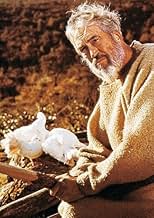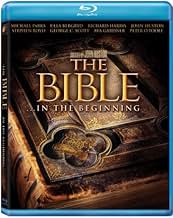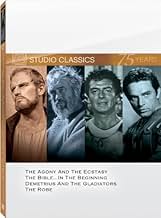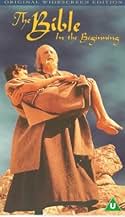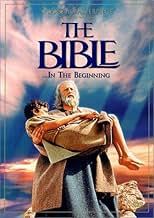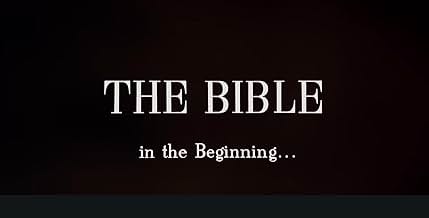IMDb RATING
6.2/10
6.7K
YOUR RATING
Extravagant production of the first part of the book of Genesis. Its main highlights are the Garden of Eden, the first brothers, Noah and his family obeying God to build an ark for the Flood... Read allExtravagant production of the first part of the book of Genesis. Its main highlights are the Garden of Eden, the first brothers, Noah and his family obeying God to build an ark for the Flood and Abraham's attempted sacrifice of Isaac.Extravagant production of the first part of the book of Genesis. Its main highlights are the Garden of Eden, the first brothers, Noah and his family obeying God to build an ark for the Flood and Abraham's attempted sacrifice of Isaac.
- Nominated for 1 Oscar
- 6 wins & 5 nominations total
Maria Grazia Spina
- Daughter of Lot
- (as Grazia Maria Spina)
Featured reviews
Whatever religious beliefs John Huston did or did not have, he treated the Scriptures with a great deal of respect. I don't see why an atheist would do a movie like this in the first place. I would think he wouldn't have wanted to touch it. But the beauty and poetry of this film is simply awesome. I would have given it ten stars, but he did take some artistic license with Scripture and he did kind of ham it up in the Noah's Ark sequence. Also, he left out the part where Noah got drunk after the flood and cursed one of his sons because they made fun of his nakedness. Otherwise, this is a beautiful film. It reminded me a little bit of HOW THE WEST WAS WON, in that he chronicled a few generations in this story, and many of the actors had little more than cameo appearances. The Creation scenes were absolutely gorgeous. I read somewhere that he didn't want to use animation drawings for the Creation, because he felt that the world was in a constant state of creation, and he had a crew film some of the wonders of the world at work. The results are stunning. The world really looks fresh and new in this film. You can tell he put a lot of care in making this film.
As a musician, I have to comment on the music in this film. It is as beautiful as the film. Too bad the soundtrack is out of print now. I had the album when I was younger and I played it nearly every chance I got. I never knew until I saw on this site that Ennio Morricone had a hand in writing some of this score (don't know which parts) but was uncredited. Instead, a Japanese composer named Toshiro Mayuzumi did most of this score, a composer I haven't heard of since.
Until PASSION OF THE Christ, this was the last of the big Bible epics and is an underrated masterpiece worth seeing. (THE LAST TEMPTATION OF Christ doesn't count because it took the Scriptures and butchered them.) 9 out of 10.
As a musician, I have to comment on the music in this film. It is as beautiful as the film. Too bad the soundtrack is out of print now. I had the album when I was younger and I played it nearly every chance I got. I never knew until I saw on this site that Ennio Morricone had a hand in writing some of this score (don't know which parts) but was uncredited. Instead, a Japanese composer named Toshiro Mayuzumi did most of this score, a composer I haven't heard of since.
Until PASSION OF THE Christ, this was the last of the big Bible epics and is an underrated masterpiece worth seeing. (THE LAST TEMPTATION OF Christ doesn't count because it took the Scriptures and butchered them.) 9 out of 10.
Just a year after his triumph in "Becket", Peter O'Toole is almost unrecognizable but does high class work as the Angel of the Lord--he's **trium in uno**--opposite Abraham and Sarah as portrayed by Ava Gardner and George C. Scott. These two great but very different actors play wonderfully off one another--Scott's earthy energy against the elegant tones and sorrowful eyes of O'Toole--who is on his way to destroy the sin cities of Sodom and Gommorah with all their inhabitants.
The other fine portrayal is of Nimrod, "a mighty hunter before the Lord", by the late actor Steven Boyd. In a single, four minutes scene he captures all the kingly hubris of this biblical figure-- the first in the book of Genesis who does not represent a nation. He who built the Tower of Babel, and saw it destroyed.
Children would be entertained by the carnival of the animals sequence depicting Noah and the Ark.
The other fine portrayal is of Nimrod, "a mighty hunter before the Lord", by the late actor Steven Boyd. In a single, four minutes scene he captures all the kingly hubris of this biblical figure-- the first in the book of Genesis who does not represent a nation. He who built the Tower of Babel, and saw it destroyed.
Children would be entertained by the carnival of the animals sequence depicting Noah and the Ark.
In her memoirs ,Ava Gardner wrote that she hated some of her lines,notably when she had to tell her servant she would give children to her husband ."I just cannot say that,it's not my style" But the director answered:"my dear,you will".
"The Bible" is par excellence the movie Huston's fans love to hate ;other examples are "the roots of Heaven" or "the barbarian and the geisha " .Hindsight displays its charms:first,it is an accurate rendition of the Genesis (the title reads "in the beginning" and it is exactly what it is).There's more voice over than dialog but if you have read the Bible (and I'm sure you have)you know that the characters have only a few lines to say .
Chapters include the Creation and the wonders of nature ;Adam and Eve;Abel and Cain (should Abel have gone veggie,crime would never happen );Noah 's ark where the animals went in two by two just to get out of the rain and the huge hippopotamus -featured in the movie- did not get stuck in the door ,thanks to the patriarch's watchful eye (played by the director himself);Nemrod (a hardly recognizable Stephen Boyd)and the tower of Babel;Abraham whose segment is the most important in the whole movie (about one hour is given over to his alliance with God,Sara and Agar -the scene of the pieces of dried fruit is worth the price of admission-,Isaac,Jehovah asking the patriarch to kill Him a son );and Loth's adventures in Sodom where the Angel warns him :do not
look back when you escape from the doomed city .Poor wife! The cinematography is splendid ,particularly in the first sequences .But the most satisfying sequences are to be found towards the end: Abraham's sacrifice takes place in the desert among ruins and here Huston seems to transcend his subject whereas in the other segments ,he only makes a picture book.
Compared to Sergio Leone's "Sodom and Gomorrah",is it so bad?
"The Bible" is par excellence the movie Huston's fans love to hate ;other examples are "the roots of Heaven" or "the barbarian and the geisha " .Hindsight displays its charms:first,it is an accurate rendition of the Genesis (the title reads "in the beginning" and it is exactly what it is).There's more voice over than dialog but if you have read the Bible (and I'm sure you have)you know that the characters have only a few lines to say .
Chapters include the Creation and the wonders of nature ;Adam and Eve;Abel and Cain (should Abel have gone veggie,crime would never happen );Noah 's ark where the animals went in two by two just to get out of the rain and the huge hippopotamus -featured in the movie- did not get stuck in the door ,thanks to the patriarch's watchful eye (played by the director himself);Nemrod (a hardly recognizable Stephen Boyd)and the tower of Babel;Abraham whose segment is the most important in the whole movie (about one hour is given over to his alliance with God,Sara and Agar -the scene of the pieces of dried fruit is worth the price of admission-,Isaac,Jehovah asking the patriarch to kill Him a son );and Loth's adventures in Sodom where the Angel warns him :do not
look back when you escape from the doomed city .Poor wife! The cinematography is splendid ,particularly in the first sequences .But the most satisfying sequences are to be found towards the end: Abraham's sacrifice takes place in the desert among ruins and here Huston seems to transcend his subject whereas in the other segments ,he only makes a picture book.
Compared to Sergio Leone's "Sodom and Gomorrah",is it so bad?
This film was released in September of 1966, which placed it at the close of a long tradition of Hollywood Biblical epics. I was around ten years old and had a vinyl LP of its great musical score which I played over and over before I finally saw the movie on the big screen of a theater. Our family was not particularly religious, but this film was one of those that had a profound influence on me and made me interested in knowing more about the Bible.
Looking at it today, I see more depth. The opening footage from all over the world of the days of the Creation is still breathtaking. As a child I felt uncomfortable with the partially nude scenes of Adam and Eve, and even now I believe nudity needs to be implied. Otherwise my mind stops focusing on the story and thinks "I just saw a naked actor!". Also, a theory of some Bible commentators is that animals are clothed with feathers or fur, and Adam and Eve were clothed with a glow of light emanating from within them. When they sinned that glow disappeared and they were then totally naked before they hit on the idea of fig leaves. (This interpretation would not likely have been known to John Huston). Beyond that, the film rolls on quite nicely through the first twenty-two chapters of Genesis. The cinematography is rich and beautiful. I do think a few too many scenes were interpreted as desert settings, since many of the Bible lands were lush and only outskirted by desert as a result of the climatology of the region being somewhat different more than 4,000 years ago (though of course that's controversial). Either way the storyline still follows the episodes of salvation history. One reviewer said it looks like they just kept shooting until they ran out of film and decided to call it quits. To me it was essential they kept going until they climaxed the film with the sacrifice of Isaac, which pointed forward to the day when God would inaugurate a new creation. Thus there is a great arc of theme in the epic from "In the Beginning" to "The New Beginning".
Overall the movie looks like a live-action version of Sunday School art. By that I mean most of the scenes are like pictures I've seen in religious artworks. For example, Adam and Eve are portrayed by clean-shaven white people. Cain bashes Abel over the head instead of slitting his throat (like the sacrifices he'd watched - see I John 3:12 in the original Jerusalem Bible [1966], not the New Jerusalem Bible [1985]). This Tower of Babel somewhat rightly resembles a Sumerian ziggurat, yet more resembles Renaissance paintings of it. Modern researchers have discovered that Noah could have been a king, and the ark was actually a huge flat barge shaped like a giant shoebox to ride the tidal waves of the Flood. The movie pictures things like I've seen them all my life: a peasant Noah, and a rounded boat with a house on top (and that shape would capsize in no time). The only thing they didn't have was a giraffe sticking out of the window.
Nevertheless, you may enjoy these traditional depictions. I'm just preferring literal Biblical research combined with the look of what has been discovered in archaeology. Yet, for me the overall effect of this film is still profound and quite moving. It's been said that George C. Scott's portrayal of Abraham was the low point of the movie, but I thought his crusty performance was inspiring! (I was also thankful they didn't picture Abraham like Santa Claus). For the most part, watching this film was an enjoyable and uplifting experience. Any Biblical movie should give us a taste of what things were like, and then we should always go back and read the Book. There we will find the authentic atmosphere of the actual words. Still, one line the scriptwriters put in the mouth of Abraham is not found in the Bible, yet it does reflect what the Bible says of him. It has helped me with my faith. It is the line where Abraham asks, "Shall the Lord speak, and Abraham not believe?"
Looking at it today, I see more depth. The opening footage from all over the world of the days of the Creation is still breathtaking. As a child I felt uncomfortable with the partially nude scenes of Adam and Eve, and even now I believe nudity needs to be implied. Otherwise my mind stops focusing on the story and thinks "I just saw a naked actor!". Also, a theory of some Bible commentators is that animals are clothed with feathers or fur, and Adam and Eve were clothed with a glow of light emanating from within them. When they sinned that glow disappeared and they were then totally naked before they hit on the idea of fig leaves. (This interpretation would not likely have been known to John Huston). Beyond that, the film rolls on quite nicely through the first twenty-two chapters of Genesis. The cinematography is rich and beautiful. I do think a few too many scenes were interpreted as desert settings, since many of the Bible lands were lush and only outskirted by desert as a result of the climatology of the region being somewhat different more than 4,000 years ago (though of course that's controversial). Either way the storyline still follows the episodes of salvation history. One reviewer said it looks like they just kept shooting until they ran out of film and decided to call it quits. To me it was essential they kept going until they climaxed the film with the sacrifice of Isaac, which pointed forward to the day when God would inaugurate a new creation. Thus there is a great arc of theme in the epic from "In the Beginning" to "The New Beginning".
Overall the movie looks like a live-action version of Sunday School art. By that I mean most of the scenes are like pictures I've seen in religious artworks. For example, Adam and Eve are portrayed by clean-shaven white people. Cain bashes Abel over the head instead of slitting his throat (like the sacrifices he'd watched - see I John 3:12 in the original Jerusalem Bible [1966], not the New Jerusalem Bible [1985]). This Tower of Babel somewhat rightly resembles a Sumerian ziggurat, yet more resembles Renaissance paintings of it. Modern researchers have discovered that Noah could have been a king, and the ark was actually a huge flat barge shaped like a giant shoebox to ride the tidal waves of the Flood. The movie pictures things like I've seen them all my life: a peasant Noah, and a rounded boat with a house on top (and that shape would capsize in no time). The only thing they didn't have was a giraffe sticking out of the window.
Nevertheless, you may enjoy these traditional depictions. I'm just preferring literal Biblical research combined with the look of what has been discovered in archaeology. Yet, for me the overall effect of this film is still profound and quite moving. It's been said that George C. Scott's portrayal of Abraham was the low point of the movie, but I thought his crusty performance was inspiring! (I was also thankful they didn't picture Abraham like Santa Claus). For the most part, watching this film was an enjoyable and uplifting experience. Any Biblical movie should give us a taste of what things were like, and then we should always go back and read the Book. There we will find the authentic atmosphere of the actual words. Still, one line the scriptwriters put in the mouth of Abraham is not found in the Bible, yet it does reflect what the Bible says of him. It has helped me with my faith. It is the line where Abraham asks, "Shall the Lord speak, and Abraham not believe?"
a beautiful music score, and some interesting segments but this film suffers from sluggishness and some serious miscasting. Even with it's all-star cast it tends to drag, from a script that hasn't achieved the best pacing. The Noah segment is by far the best, with Huston himself playing both Noah and the voice of God. Peter O' Toole is very otherworldly as the angels, but George C. Scott (an actor I admire very much) is really out of his element as Abraham. And the script has been cursed with one of the great failings of the Bible itself. Translated into English of early seventeenth century England, the language used by the people in the bible has remained in that stilted form. As our language has evolved and changed over the centuries the Bible hasn't and it becomes truly tedious in a motion picture of this length. Even Hollywood realized this with most of the great religious epics they dropped the "thees" and "thous" and "thys" and "thines" which are no longer in general practice since the days of the puritans. Still it is a fair and reverent look at the book of Genesis.
Did you know
- TriviaDino De Laurentiis originally announced that this would be the first in a series of feature films based on the books of the Bible. The film lost Twentieth Century-Fox $1.5 million, and sequel plans were abandoned.
- GoofsAt the end of an early dialog between Sarah and her handmaid, Hagar stands up and turns around, heading for the door. A modern zipper is visible on the back of her tight dress.
- ConnectionsEdited into Catalogue of Ships (2008)
Details
- Release date
- Countries of origin
- Language
- Also known as
- La Biblia
- Filming locations
- Galapagos Islands, Ecuador(creation)
- Production companies
- See more company credits at IMDbPro
Box office
- Budget
- $18,000,000 (estimated)
- Runtime
- 2h 54m(174 min)
- Color
- Aspect ratio
- 2.20 : 1
Contribute to this page
Suggest an edit or add missing content



